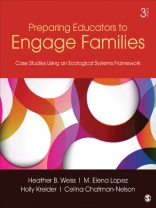Constant changes in education are creating new and uncertain roles for parents and teachers that must be explored, identified, and negotiated.
Preparing Educators to Engage Families: Case Studies Using an Ecological Systems Framework, Third Edition encourages readers to hone their analytic and problem-solving skills for use in real-world situations with students and their families.
Organized according to Ecological Systems Theory (of the micro, meso, exo, macro, and chrono systems), this completely updated
Third Edition presents research-based teaching cases that reflect critical dilemmas in family-school-community relations, especially among families for whom poverty and cultural differences are daily realities. The text looks at family engagement issues across the full continuum, from the early years through pre-adolescence.
NEW TO THIS EDITION
- The text addresses bold and exciting new directions in the field of family engagement in education, including the explosive growth of digital media and learning, the investment in student performance data systems, the focus on personalized student learning, and the need for systemic—rather than ‘random acts’—of family engagement.
- New theoretical perspectives on early childhood education and family engagement speak to issues of quality learning settings and school readiness.
Зміст
Microsystem Theory: Motivation to Learn – Deborah Stipek
Microsystem Theory:A Developmental-Contextual Perspective – Penny Hauser-Cram, Marji Erickson Warfield, Jack P. Shonkoff, Marty Wyngaarden Krauss, Aline Sayer, Carole Christofk Upshur, Miriam Grill-Abramowitz Heyman
Microsystem Case: Supporting Ignacio: A Mother Discovers How to Help Her Son Succeed – Georganne Morin, Holly Kreider
Microsystem Case: A Special Education Plan for Anabela: Does Supporting Her Needs Mean Holding Her Back? – Margaret A. Vaughan
Microsystem Case: My Favorite Subject Is Lunch – Phyllis Blumenfeld
Mesosytem Theory: Social Executive Functioning – Pamela Davis-Kean, Jacquelynne S. Eccles
Mesosystem Theory: The Family, School and Community Relationship – M. Elena Lopez, Heather B. Weiss
Mesosystem Case: Lunchtime at Sunnydale Elementary School: What Do First Graders Need? – Barrie Thorne
Mesosystem Case: Defining “Fine”: Communicating Academic Progress to Parents – Margaret Caspe, Holly Kreider
Mesosystem Case: Bilingual Voices and Parent Classroom Choice: Family Engagement in Language and Literacy – Margaret Caspe
Exosystem Theory: Media in the Lives of Families With Young Children – Lori Takeuchi
Exosystem Theory: The Accommodation Model – Julia R. Henly
Exosystem Case: Connections and Misconnections: Digital Media in Family Life and at School – Lori Takeuchi
Exosystem Case: After School for Cindy: Family, School, and Community Roles in Out-of-School Time – Ellen Mayer
Exosystem Case: Piecing It Together: Linking Systems to Support a Student and Family – Jennifer Romich, Jennifer Simmelink
Macrosystem Theory: The Promise of Parent-School Partnerships for Narrowing the Poverty Achievement Gap – Eric Dearing, Sandra Tang
Macrosystem Theory: Ethnic and Racial Diversity – Cynthia Garcia Coll, Celina Chatman-Nelson
Macrosystem Case: What Words Don’t Say: Talking About Racism – Ann Barger Hannum
Macrosystem Case: Raising Children Alone: Poverty, Welfare Reform, and Family Involvement – Eboni C. Howard
Macrosystem Case: Learning in the Shadow of Violence: Community, Culture, and Family Engagement – Cynthia Garcia Coll
Chronosystem Theory: Families, Time, and Learning – Suzanne M. Bouffard, Heather B. Weiss
Chronosystem Case: Bridging Worlds: Family Engagement in the Transition to Kindergarten – Margaret Caspe
Chronosystem Case: Tomasito Is Too Big to Hold Hands: The Developing Child and the Home-School Relationship – Ellen Mayer
Chronosystem Case: Staying on the Path Toward College: One Boy at the Crossroads – Catherine R. Cooper, Elizabeth Dominguez, Margarita Azmitia, Erica Holt, Dolores Mena, Gabriela Chavira
Про автора
Celina Chatman-Nelson (Ph.D, Rutgers University) is a Visiting Program Associate in the College of Education at the University of Illinois at Chicago, where she directs a project aiming to identify challenges and solutions in preparing early childhood teachers to work with all young children and their families. She was formerly associate director for the Herr Research Center for Children and Social Policy at Erikson Institute, and prior to that she was associate director for the Center for Human Potential and Public Policy at the University of Chicago’s Harris Graduate School of Public Policy Studies. Chatman-Nelson also worked as a Senior Research Associate at the University of Michigan’s Institute for Social Research and Institute for Research on Women and Gender, where she led analyses on adolescent identity and achievement motivation in the context of race and ethnicity. Other edited volumes include Developmental Pathways Through Middle Childhood (Lawrence Erlbaum, 2005, with Catherine Cooper, Cynthia Garcia Coll, W. Todd Bartko and Helen Davis) and Navigating the Future: Social Identity, Coping, and Life Tasks (Russell Sage Foundation, 2005, with Geraldine Downey and Jacquelynne S. Eccles). Dr. Chatman-Nelson received her Ph D in social psychology from Rutgers University.












